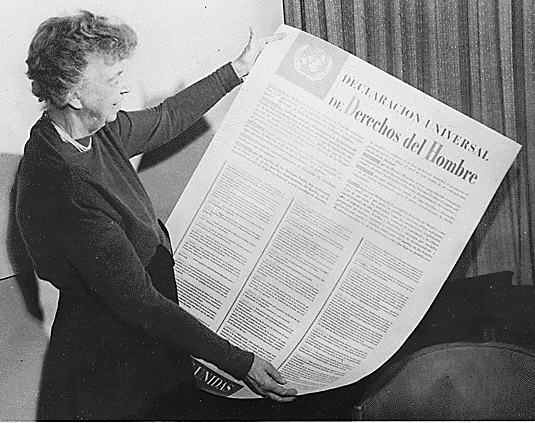The Great Question: Where Do Human Rights Begin for Business?

In her 1958 address to the United Nations in New York, Eleanor Roosevelt posed what she called "the great question," saying:
Where, after all, do universal rights begin? In small places, close to home — so close and so small that they cannot be seen on any maps of the world. Yet they are the world of the individual person; the neighborhood he lives in; the school or college he attends; the factory, farm or office where he works. Such are the places where every man, woman, and child seeks equal justice, equal opportunity, equal dignity without discrimination. Unless these rights have meaning there, they have little meaning anywhere.
The recent display of racism, bigotry and violence in the city of Charlottesville, Virginia last weekend has raised alarms and drawn condemnation from large swaths of society, from human rights groups and academics to business leaders and concerned citizens. As a group of United Nations human rights experts rightly observed, this disturbing anti-diversity demonstration was only the latest in a string of examples of increased racial tensions and xenophobia in the United States.
United Nations Secretary-General António Guterres noted to journalists during a press conference this week that this trend transcends borders, saying that “racism, xenophobia, anti-Semitism or Islamophobia are... poisoning our societies,” and that “it is absolutely essential for us all to stand up against them everywhere and every time.”
There was widespread rebuke of the tactics and ideology of the white supremacist protesters in Charlottesville from CEOs and business leaders in the United States. The lack of condemnation from the US Government also drew strong criticism, including from CEOs on the now-disbanded US economic council, several of whom lead companies that participate in the United Nations Global Compact. Before the disbanding, several CEOs of UN Global Compact companies made the decision to step down from the council, citing anti-discrimination concerns, including Kenneth Frazier (Merck), Brian Krzanich (Intel), Denise Morrison (Campbell Soup) and Inge Thulin (3M).
Companies like these who join the UN Global Compact, an organization I am proud and honoured to lead, commit to Ten Principles in the areas of human rights, labour, environment and anti-corruption. The UN Global Compact’s human rights principles are derived from the Universal Declaration of Human Rights, of which Eleanor Roosevelt played an instrumental role in drafting. When she gave her “great question” speech, it was nearly 10 years since the proclamation of the monumental Declaration. Now, nearly 70 years since its adoption, the UN Global Compact continues to support companies around the world in meeting their minimum responsibilities to respect human rights.
Business leaders know that diversity and inclusion are the way forward. From driving growth and innovation to promoting better decision-making and enhancing employee engagement, diversity and inclusion improve overall corporate performance. Further, leaders know their employees, customers and shareholders expect it of them.
As a former business executive, it comes as no surprise to me that CEOs are calling out discrimination and making the case for social cohesion. I applaud the business leaders who, in public and in private, are standing up for human rights by disavowing racism and intolerance. Just as importantly, they are also educating their audiences about these issues and integrating solutions into their business models. Rather than simply criticizing, they are actually fostering the change we need.
While Governments bear the responsibility of protecting individuals against human rights abuses, we are living in times where the business community is being called upon to do more. In our role as the United Nation’s centrepiece for responsible business action, the UN Global Compact is increasing our capacity to support companies everywhere in standing up for human rights. As Eleanor noted in her “great question,” the beginning of universal rights is in the small places. We all need to be doing our part to amplify non-discrimination and equality, and to lead as living answers to this timeless question.

